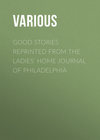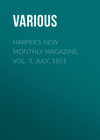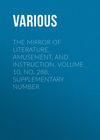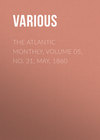Loe raamatut: «Mrs. Whittelsey's Magazine for Mothers and Daughters», lehekülg 27
FIRST PRAYER IN CONGRESS
In the letters of John Adams to his wife, Sept. 10, 1774, we have an account of the First Prayer in Congress. What an instructive and encouraging lesson is here taught to all religious persons, always unhesitatingly to obey all holy and good impulses.
Had Mr. Cushing, who moved the resolution, held back,—or had Mr. Samuel Adams refused to second this resolution,—or had Rev. Mr. Duché declined, when called upon to lead on that occasion, our nation might never have presented the sublime spectacle of uniting, as a body, in calling upon God at the opening of their Congressional sessions.
And who would dare to predict the loss which this omission might at that time have occasioned to this infant Republic!
Mr. Adams's account is as follows:—
"When Congress first met, Mr. Cushing moved that it should be opened with prayer. This was opposed on the ground that the members, being of various denominations, were so divided in their religious sentiments that they could not join in any one mode of worship. Mr. Samuel Adams arose, and after saying that he was no bigot, and could hear a prayer from any gentleman of piety and virtue who was a friend to his country, moved that Rev. Mr. Duché—an Episcopal clergyman, who, he said, he understood deserved that character—be invited to read prayers before Congress the next morning. The motion was passed; and the next morning Mr. Duché appeared, and after reading several prayers in the Established form, then read the Collect for the 7th of September, which was the thirty-fifth Psalm. This was the next morning after the startling news had come of the cannonade of Boston;" and, says John Adams, "I never saw a greater effect upon an audience: it seemed as if Heaven had ordained that Psalm to be read on that morning."
"After this," he continues, "Mr. Duché, unexpectedly to everybody, struck out into an extemporaneous prayer, which filled the bosom of every man present. I never heard a better prayer, or one so well pronounced. Dr. Cooper himself never prayed with such fervor, ardor, earnestness, and pathos, and in language so eloquent and sublime, for America, for the Congress, for the province of Massachusetts, and especially for Boston. It had an excellent effect upon everybody here," and many, he tells us, were melted to tears.
Original
MY BABY
Within a cradle, still and warm,
There lies a little gentle form,
Just look beneath the coverlid,
And see the tiny sleeper hid!
Then peep beneath the cap of lace,
Behold his rosy happy face;
The velvet cheek, so pure and white,
Didst ever see a fairer sight?
His dimpled arm across his breast,
His chubby limbs composed to rest,
The gentle curls of waving hair,
Falling upon the pillow there!
The drooping lashes shroud his eyes,
Blue as the tinge of summer skies,
His damask lips like tints of rose
Which garden buds at twilight close.
Art thou a form of human mould,
Or stray-lamb of the heavenly fold?
A little herald to the earth,
Or cherub sent to bless our hearth?
Must evil spirits intertwine
And lead astray that heart of thine?
And must thou be with sin defiled,
That seemest now an angel child?
Oh blessed Lamb of God! to thee
I come, and with my baby flee
Within thy fold, and sheltering care,
I lay my child, and leave him there.
Euclid, Ohio.
Original
THE MOTHER'S PORTRAIT
Night was coming on. The tall elms which beautify the little village of G– were waving to and fro their pendent branches, heavy with the evening damp, and as the boughs swayed against the window panes of one of the largest mansions in the town, the glass was moistened by the crystal drops. But heavier and colder was the dew that gathered upon the forehead of the sufferer within; for extended upon the couch lay a dying woman.
The trembling hand of an aged man wiped the forehead, and the tears that stood in his eye told that his remaining days on earth must be uncheered by the kind voice and radiant smile of her who had been a mother to his children. Those children, grown to full age, were there, and if need be could have borne clear and convincing testimony that sometimes, at least, the connection between a step-mother and her husband's family is only productive of good. But where were her own offspring? Three noble looking men, and as many matrons, owed their existence and education to her, and she had hoped, ere she died, to behold once more their faces.
Soft and gentle were the hands that smoothed her pillow; low and sweet were the voices that inquired of her wants, but dear to her as were these, they were not her own, and the mother's heart yearned once more to trace their father's likeness in the tall dark-eyed sons who but a few years ago were cradled in her arms. And can these feelings cause the pang which seems at once to contract the face? So thinks her step-daughter, as she says, "They will be here to-morrow, mother." "It is not that, my dear," murmured the sick one, "but when I was just now enjoying the blessedness of committing my soul to Him who died for me, when feeling my own unworthiness of one of his many mercies, I had cast myself on the mercy of the 'Sinner's Friend,' like a wave of agony rushed in upon me the thought that my dear sons have denied the divinity of the Savior, into whose name they were baptized, and who laid down his life to redeem them. Oh! could I be assured that they would be led back to their fathers' God, I could die happy." There was stillness in this chamber of death. The invalid's pale lips moved as if in prayer, and soon the lids were raised, and the brilliant black eye was lighted up as of old, and triumphant was the strain that burst forth. "I know in whom I have believed, and am persuaded that He will keep that which I have committed to Him, my most precious treasures, my children, against that day. I know Him—I rest in His faithfulness." The smile lingered on her features, but the spirit had fled.
The Green Mountain range in Massachusetts presents a series of most magnificent scenery, and in the villages which nestle among its summits, dwell some of the noblest hearts and sturdiest frames of New England.
Mountains have always been the rugged nurses of independence of thought and action, and the grand chains of our own land form no exception to the rule. Nor is this all—none who have not dwelt among our rural population know the strong sympathy which pervades the inhabitants of the same settlement—long may it continue! Each takes an interest in the welfare of all about him, and though there are some things disagreeable in the minute surveillance to which one is thus exposed, yet it is more than compensated by the affectionate interest which is manifested in the weal or woe of each neighbor. Not there, as in the crowded city, may a man be laid in his grave, while the occupant of the next dwelling neither knows nor cares concerning his fate.
The intelligence of illness spreads from house to house, and who can number the kind offices which are immediately exercised by neighbors far and near. The very schoolboys lower their voices as they pass the darkened windows, and there needs no muffling of the knocker, for who would disturb the invalid? And when the bell solemnly announces the departure of a soul, sadness settles in every heart, and the cathedral hung in sable is a poor tribute to departed worth, compared to the general mourning of the whole village, when the long funeral procession, whence old and young unite
"To pay the last sad tribute, and to hear
Upon the narrow dwelling's hollow bound,
The first earth thrown."
Oh! who would not exchange the pomp and hollow pageantry of the metropolis for such attentions?
In one of these same homes of virtue and happiness dwelt a family, who, contented with their lot, sought no wide sphere of enjoyment. With a good education, fine talents, with a strong constitution, the father had commenced his career about forty years before, and by his own exertions had risen to wealth, respectability and honor. Having often represented the interests of his fellow-townsmen in the assembly of the State, the county in which he resided had deemed that they could commit to no safer hands the senatorial dignity.
His gentlemanly bearing, his benevolent smile, his tall and commanding appearance won all hearts; while his calm judgment, his energetic course of action gained respect and demanded admiration. In public and private life he was a pattern of excellence. Surely his mother must have looked upon such a son with feelings of gratitude and even pride. As you enter the door, from which no poor man was ever turned empty away, and crossing the hall, advance into the elegant parlor to greet your host and his amiable wife, you can fancy a smile of satisfaction upon the lips of that mother's portrait, which hangs in the place of honor on the wall, a smile which seems to say, "this is my eldest born." But, alas! it was for this son that that mother had put up her last prayer—for him it was, she had poured forth her soul, and now years have passed since he stood by her helpless remains, and her petition is still unanswered.
It is a May morning, two years later, and cheerily does the sun shine upon the village of –. The pine forest at a little distance, sheds forth after the last night's rain that fragrance which is so delicious, the fields are gay with dandelions, the brooks yellow with the American cowslip, close beside which peeps forth the lovely veronica, while yonder slope is enameled with bright blue violets, and the little white Mayflower. But no children are seen plucking them. The very herds in the field low in a subdued manner, and the birds warble their gladsome spring song with a depth which belongs only to sacred music. None are moving about the streets. The church doors are open, however, for it is the Sabbath. Come with me to yonder mansion—the tasteful shrubbery, the vine-covered window, the well arranged garden bespeak for its possessor wealth and luxury. Enter with me, but tread lightly as we ascend the staircase. Upon that white curtained bed, raised by pillows, reposes one who has numbered more than sixty summers. His brow is scarcely furrowed, though his face is thin. His clasped hands are emaciated, but he does not look old. The fever spot burns in his cheeks, and his eye is lighted up with a heavenly ray, which shows that now at least the soul is triumphing over the body.
A small table, covered with damask of snowy whiteness, stands near, on which are placed the emblems of the broken body and poured-forth blood of our Redeemer. A few Christian brethren and sisters are kneeling around, and the pastor is blessing the bread. Methinks "it is good to be here." The great Master is present, and "his banner over this little company is love." One can almost see the ministry of angels as they bend to watch the scene.
The rite is done. The softly murmured hymn which concludes it, has died upon the balmy evening air. The partakers of the Lord's Supper have departed. The pastor has for the last time pressed the hand which has so recently subscribed to the covenant of the church, and he, too, has taken his final leave. Relations alone remain in the chamber of death. Solemnity broods over the spot. The brothers who through life have looked to this now dying brother, as a father, guide, and friend, sit gazing on him in mournful silence, the tears slowly chasing each other down their manly cheeks, with something of the feeling of the prophet when it was told him, "Know thou that your master will be taken from your head to-day".
The sisters watch and anticipate his wishes, till first one and then another is overcome by her emotion, and steals away to give it vent. The wife, like a ministering spirit, silently wipes the clammy brow and moistens the parched lips. But now the sick man speaks: "Brother, will you bring mother's portrait! I would take my leave of that—O, how soon shall I join her now." It is brought, and the heavy window curtains are thrown back, and it is placed at the foot of the bed with reverend care, which showed the veneration in which the original was held.
"Look, brother: it smiles upon me!" and observing the astonished expression of his friends, the dying man continued in a less excited tone, "Do not suppose that my mind is wandering. I assure you on the word of one who must shortly appear before a God of truth, that ever since my mother's death the picture has frowned upon me. I knew what it meant, for you have not forgotten her last prayer, and every time I have looked upon it I felt, while I continued to deny the divinity of our Savior, I could not expect my mother's approbation or blessing. For years I fought against the doctrine of the Holy Trinity, till I examined the subject more thoroughly, and to-day I have sealed my renunciation of that error, and have testified my faith in the atonement made for sinners. The cross of Christ has drawn me with cords of love. I wanted to see that portrait once more, and, lo, the frown is gone—and my mother beams upon me the same sweet smile as when at sixteen years of age I left home a fatherless boy, to make my own way in the world. Thank God I die in peace."
My sketch is finished. Shall I make the application? Has not every mother's heart made it already? asking the question, "Is my influence over my children such that when I am gone my portrait shall have such power over them for good?"
Cowper has embalmed his mother's miniature in lines which will touch the heart while our language is preserved. But this picture is hallowed by strains which are poured forth from angelic choirs, as they tune their harps anew "over one sinner that repenteth."
The likeness of Cowper's mother led him to mourn for past delights, but this picture led the son to look in humble joy to that blessed hope and glorious appearing of the great God and our Savior Jesus Christ.
Edith.
Original
LIGHT READING
During a recent tour in search of health and pleasure, I was surprised and pained at seeing the amount of light reading indulged in while traveling, by old and young of both sexes and all classes. I observed, while rapidly urged over our railways, many thus engaged—many purchasing eagerly the trash offered at every station, and could but regret they had not provided with the same care food for the mind, by placing in the satchel that contained sustenance for the body, some valuable book, some truthful work.
Lake George, with its clear waters and lovely islands, its majestic, untrod mountains and historical associations, had not attractions sufficient to win the lovers of fiction from the false pages of life, to the open, beautiful book of Nature. It was a bright July morning when I stood upon the deck of the "John Jay."
"The beautiful sun arose—and there was not
A stain upon the sky, the virgin blue
Was delicate as light, and birds went up
And sang invisibly, the heavenly air
Wooed them so temptingly."
Now the mountain-tops were radiant with the golden light, now valley, lake, and green islet, rejoiced in the morning sun. Yet, at such an hour, amid such scenes, ladies and gentlemen were engrossed with the mawkish sentimentalities of fictitious narrations, their eyes closed to all the beauty of the time and place, their ears deaf to the delicious harmony of awakening nature.
Lake Champlain, with its romantic ruins ever dear to the heart of an American, its verdant shores and rural villages, nestling in the valleys or crowning the hills, could scarce obtain a passing glance from those enraptured with the improbable if not impossible pictures of life.
When upon the St. Lawrence, gliding swiftly through the charming scenery of the Thousand Isles, that like emerald gems adorn the bosom of that noble river, now passing one with cultivated fields and quiet farm-house, another low and level bathed in the rays of a setting sun, others rocky and precipitous, crowned with cedar and fir; again a little quiet spot where one would like long to tarry, or one with shrubbery and light-house so peaceful in its rural beauty you almost envied the occupants their retirement; even here, as I turned from the scene at the whispered exclamation of a friend, "O, how beautiful!" my eye fell upon two ladies bending over the pages of newly issued novels, their countenances glowing—not with holy emotions awakened by the enjoyment of a summer's sun-set upon the St. Lawrence, but with feverish excitement, kindled by the overwrought pictures of the novelist. Fair, young girls, how could you linger over the unreal when passing through such scenes of God's own work? How could you shut out that gorgeous sunset, turn from all the pure and heavenly feelings such scenes must awaken, to sympathize with imaginary beings and descriptions?
And now I tarried at Niagara, wonderful, sublime Niagara—
——"Speaking in voice of thunder
Eternally of God—bidding the lips of man
Keep silence, and upon the rocky altar, pour
Incense of sweet praise."
Rambling along the shore of Iris Island, every step presenting a new scene, impressing the mind with the greatness of God and the insignificance of man, while "the voice of many waters" proclaimed to erring reason "there is a God:" also, here, under the shade of a noble oak, in full view of the great Cataract, sat a small group of ladies; in their midst, a gentle girl reading aloud from one of the many works that "charm the greedy reader on, till done, he tries to recollect his thoughts and nothing finds—but dreamy emptiness." I lingered, and learned this was the tale of a young authoress, whose writings are now winning golden opinions from a portion of our religious press. Yet how unsuitable the place for delighting in the extravagant and improbable blending of truth and fiction, though it may have a moral and religious under-current. At the side of that young reader sat her mother. The favorable moments for impressing that immortal mind committed to her guardianship, with right views of the Infinite Supreme, were swiftly passing away, the opportunity of awakening in her young heart while beholding His wonderful work emotions of humility and reverence was alike forgotten; with the daughter just entering upon womanhood she gave all thought and feeling, alone to the ideal. Could I have aroused that parent to a sense of her obligations, of her neglected opportunities, of the priceless value of her child's soul, stranger though I was, I would have earnestly besought her, to take away that romance, to step with her to the point but just before them—open the "Book of books," and let her read of Him "who hath measured the waters in the hollow of his hand, and meted out heaven with a span; who hath compassed the waters with bounds until the day and night come to an end; whose way is in the sea, and his path in the great waters. The Lord, whose name alone is excellent, his glory above the earth and heaven."
Theta.
Original
TO MY FATHER,
AFTER A WRECK OF FORTUNE, AND IN A FOREIGN LAND
All gone—yet 'mid this heavy loss
A ray of light behold;
If thou art parted with the dross,
There's left for thee the gold.
A name unsullied—conscience clear,
From aught that man can prove;
And, what must be to thee most dear,
Thy children's changeless love.
The visions of the world so fair
Are fading from our sight;
Yet hope sinks not in vain despair,
But points to one more bright.
Oh, may misfortune's chilling blight,
But bind us closer here,
Till we behold the dawning light
Of yonder blessed sphere.
And O, my father, linger not,
In exile, from our hearth;
Ah, this has been a cherished spot,
To make us cling to earth.
'Tis where the youngest of the seven
First drew his fleeting breath,
Sweet cherished flower, the gift of heaven,
To fill our blooming wreath.
And saddened memories linger not
Around each faded year;
Oh, let it never be forgot
Death hath not entered here.
The shrine of many a fervent prayer,
More loved than words can tell,
Is passing to another's care,
And we must say, Farewell.
But O, my father, hasten home,
'Tis in each loved one's heart;
Thy wife, thy children, bid thee come,
And ne'er again depart.
For me, my love shall ever twine
Around thy future years;
And my most fervent prayers be thine
Amid this vale of tears,
That when life's busy cares shall cease—
Its feeble ties be riven;
Thine honored head may rest in peace,
Thy soul ascend to heaven.














![Birds and Nature Vol. 11 No. 5 [May 1902]](https://cdn.litres.ru/pub/c/cover_100/25570807.jpg)





